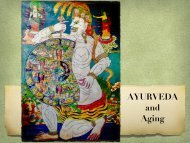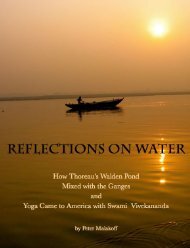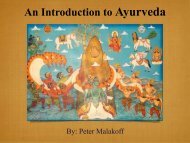How Thoreau's Walden Pond Mixed with the Ganges and Yoga Came to America with Swami Vivekananda
One early morning in 1846, during the coldest days of a New England winter, Henry David Thoreau looked out the window of his small cabin on Walden Pond and saw men cutting its ice into blocks. That ice was hauled by horse to a railroad that ran across the western edge of Walden Pond, packed into a boxcar, taken to Boston and loaded onto a clipper ship that sailed to Calcutta, India, arriving about four months later. Once there, that ice was purchased by grateful members of the East India Company. Thoreau had witnessed a small part of the global ice trade between New England and India that took place during the latter part of the nineteenth century. When Thoreau considered the ice trade, his vision sailed on metaphors far beyond the scope of business. The waters he imagined flowed both east and west and carried not just natural elements, but culture, religion and philosophy as well. He envisioned that after arriving in Calcutta, the New England ice of Walden Pond would eventually melt and run downhill where it would join with the sacred water of the Ganges. He wrote in Walden: "It appears that the sweltering inhabitants of Charleston and New Orleans, of Madras and Bombay and , drink at my well. In the morning I bathe my intellect in the stupendous and cosmogonal philosophy of the , since whose composition years of the gods have elapsed, and in comparison with which our modern world and its literature seem puny and trivial; and I doubt if that philosophy is not to be referred to a previous state of existence, so remote is its sublimity from our conceptions. I lay down the book [Bhagavad-Gita] and go to my well for water, and lo! there I meet the servant of the Bramin, priest of and and who still sits in his temple on the Ganges reading the , or dwells at the root of a tree with his crust and water jug. I meet his servant come to draw water for his master, and our buckets as it were grate together in the same well. The pure Walden water is mingled with the sacred water of the Ganges." This book tells the story of these waters . . .
One early morning in 1846, during the coldest days of a New England winter, Henry David Thoreau looked out the window of his small cabin on Walden Pond and saw men cutting its ice into blocks. That ice was hauled by horse to a railroad that ran across the western edge of Walden Pond, packed into a boxcar, taken to Boston and loaded onto a clipper ship that sailed to Calcutta, India, arriving about four months later. Once there, that ice was purchased by grateful members of the East India Company. Thoreau had witnessed a small part of the global ice trade between New England and India that took place during the latter part of the nineteenth century.
When Thoreau considered the ice trade, his vision sailed on metaphors far beyond the scope of business. The waters he imagined flowed both east and west and carried not just natural elements, but culture, religion and philosophy as well. He envisioned that after arriving in Calcutta, the New England ice of Walden Pond would eventually melt and run downhill where it would join with the sacred water of the Ganges. He wrote in Walden: "It appears that the sweltering inhabitants of Charleston and New Orleans, of Madras and Bombay and , drink at my well. In the morning I bathe my intellect in the stupendous and cosmogonal philosophy of the , since whose composition years of the gods have elapsed, and in comparison with which our modern world and its literature seem puny and trivial; and I doubt if that philosophy is not to be referred to a previous state of existence, so remote is its sublimity from our conceptions.
I lay down the book [Bhagavad-Gita] and go to my well for water, and lo! there I meet the servant of the Bramin, priest of and and who still sits in his temple on the Ganges reading the , or dwells at the root of a tree with his crust and water jug. I meet his servant come to draw water for his master, and our buckets as it were grate together in the same well. The pure Walden water is mingled with the sacred water of the Ganges."
This book tells the story of these waters . . .
Create successful ePaper yourself
Turn your PDF publications into a flip-book with our unique Google optimized e-Paper software.
Vedas<br />
"The Hindus have received <strong>the</strong>ir religion through revelation, <strong>the</strong> Vedas. They<br />
hold that <strong>the</strong> Vedas are <strong>with</strong>out beginning <strong>and</strong> <strong>with</strong>out end. It may sound ludicrous,<br />
that a book can be <strong>with</strong>out beginning or end. But by <strong>the</strong> Vedas no books<br />
are meant. They mean <strong>the</strong> accumulated treasury of spiritual laws discovered by<br />
different persons at different times. Just as <strong>the</strong> law of gravitation acted before its<br />
discovery by humanity, <strong>and</strong> would continue <strong>to</strong> act if all humanity forgot it, so is<br />
it <strong>with</strong> <strong>the</strong> laws that govern <strong>the</strong> spiritual world. The discoverers of <strong>the</strong>se laws are<br />
called Rishis, <strong>and</strong> we honor <strong>the</strong>m as perfected beings. Now <strong>the</strong> Vedas teach us<br />
that creation is <strong>with</strong>out beginning or end. Science has proved <strong>to</strong> us that <strong>the</strong> sum<br />
<strong>to</strong>tal of cosmic energy is always <strong>the</strong> same.<br />
They were written, nobody knows at what date, it may be 8,000 years ago, in<br />
spite of all modern scholars may say; it may be 9,000 years ago. Not one of<br />
<strong>the</strong>se religious speculations is of modern date, but <strong>the</strong>y are as fresh <strong>to</strong>day as <strong>the</strong>y<br />
were when <strong>the</strong>y were written..."<br />
– Vivekan<strong>and</strong>a in his address <strong>to</strong> <strong>the</strong> World Parliament of Religions 1893<br />
“The Vedic literature opens <strong>to</strong> us a chapter in what has been called <strong>the</strong> education<br />
of <strong>the</strong> human race, <strong>to</strong> which we can find no parallel anywhere else.”<br />
– Max Muller, Indologist<br />
“The Vedas (knowledge) are a large body of texts originating in ancient India.<br />
Composed in Vedic Sanskrit, <strong>the</strong> texts constitute <strong>the</strong> oldest layer of Sanskrit<br />
literature <strong>and</strong> <strong>the</strong> oldest scriptures of Hinduism. The Vedas are apauruṣeya<br />
("not of human agency"). They are supposed <strong>to</strong> have been directly revealed, <strong>and</strong><br />
thus are called śruti ("what is heard"), distinguishing <strong>the</strong>m from o<strong>the</strong>r religious<br />
texts, which are called smṛti ("what is remembered").”<br />
– Wikipedia, The Free Encyclopedia<br />
Related Glossary Terms<br />
Brahmin, Max Muller, Upanishads, Vedanta, Vedic literature of India<br />
Index<br />
Find Term<br />
Section 6 - Introduction<br />
Chapter 1 - <strong>How</strong> <strong>Thoreau's</strong> <strong>Walden</strong> <strong>Pond</strong> <strong>Mixed</strong> <strong>with</strong> <strong>the</strong> <strong>Ganges</strong> <strong>and</strong> <strong>Yoga</strong> <strong>Came</strong> <strong>to</strong> <strong>America</strong> <strong>with</strong> <strong>Swami</strong> Vivekan<strong>and</strong>a<br />
Chapter 1 - <strong>How</strong> <strong>Thoreau's</strong> <strong>Walden</strong> <strong>Pond</strong> <strong>Mixed</strong> <strong>with</strong> <strong>the</strong> <strong>Ganges</strong> <strong>and</strong> <strong>Yoga</strong> <strong>Came</strong> <strong>to</strong> <strong>America</strong> <strong>with</strong> <strong>Swami</strong> Vivekan<strong>and</strong>a<br />
Chapter 1 - <strong>How</strong> <strong>Thoreau's</strong> <strong>Walden</strong> <strong>Pond</strong> <strong>Mixed</strong> <strong>with</strong> <strong>the</strong> <strong>Ganges</strong> <strong>and</strong> <strong>Yoga</strong> <strong>Came</strong> <strong>to</strong> <strong>America</strong> <strong>with</strong> <strong>Swami</strong> Vivekan<strong>and</strong>a


















